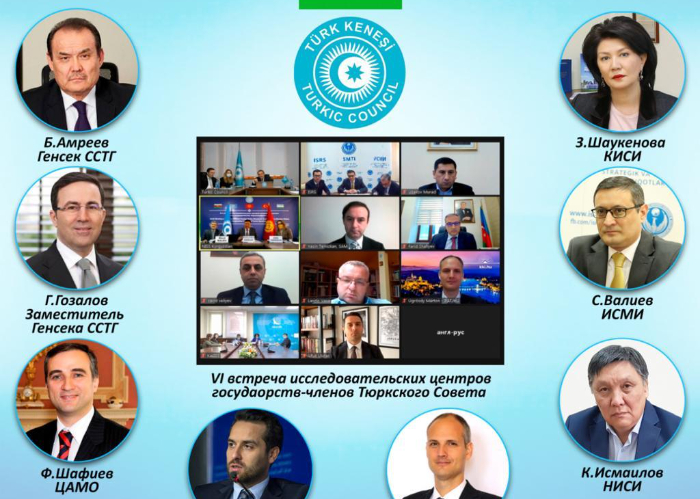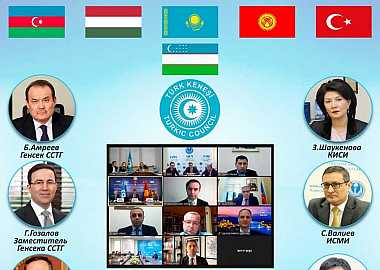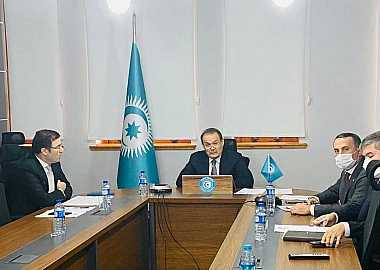The 6th Meeting of the Foreign Policy Research Centers of the Member States of the Turkic Council hosted by the National Institute for Strategic Studies of the Kyrgyz Republic in the format of a video conference call on 19 November 2020.
The keynote speech of the meeting was delivered by H.E. Baghdad Amreyev, the Secretary General of the Turkic Council.
Moderated by Mr. Kuvanychbek Ismailov, Deputy Director of the National Institute for Strategic Studies, the meeting was attended by Ambassador Farid Shafiyev, Director of the Center of Analysis of International Relations of the Republic of Azerbaijan (AIR Center), Mrs. Zarema Shaukenova, Director of the Kazakhstan Institute for Strategic Studies (KISI) under the President of the Republic of Kazakhstan, Mr. Ufuk Ulutaş, Chairman of the Center for Strategic Studies at the Ministry of Foreign Affairs of the Republic of Turkey, Mr. Sanzhar Valiev, Deputy Director of the Institute for Strategic and Interregional Studies under the President of the Republic of Uzbekistan, Mr. Marton Ugrosdy, Director of the Institute for Foreign Affairs and Trade of Hungary, as well as experts of those think tanks.
Secretary General Baghdad Amreyev underlined the growing role of Turkic Speaking Countries and the Turkic Council as an organization in recent years, important position of Turkey in international affairs, the liberation of Azerbaijani lands, rapid development of Uzbekistan, traditionally positive role of Kazakhstan in regional and international matters and importance of Kyrgyzstan in Central Asia region as well as Hungary’s rising influence in Eastern Europe. He stated that all these factors are indicating the significance of the place of our Member and Observer States in international arena thus should be subject of our research and must be carefully analyzed.
He highlighted that on a larger scale, the Council aims to build stronger consensus in foreign policy among its Member States and to ensure a higher level of mutual support on the global political scene.
In this context, touching upon on the significance of the historical achievement of Azerbaijan in liberation of its occupied territories and restoring sovereignty over them in accordance with its rights based on the norms and principles of international law, Baghdad Amreyev expressed his confidence that this just victory of Azerbaijan will bring a new momentum to the strong relationship within the Turkic Council that will lead to furthering integration processes and unity in the Turkic World.
The Secretary General noted that a significant number of other countries have expressed their interest in obtaining observer status in the organizations, highlighting how the Turkic Council has become a respected partner in the international and regional cooperation.
He also briefed the participants on the “Turkic Council Strategy for 2020-2025” (Strategy 2025) that will lay the foundation for the long-term goals of the Turkic Council and its Member States. He added that the Strategy 2025 will be reflected in the “Turkic World Vision - 2040” document, a vision that relies on developing political cohesion to act as one on a wide range of international issues, supporting a more dynamic cooperation under the umbrella of the Turkic Council, achieving trade integration, establishing a single Turkic investment space, realizing digital integration, upgrading transport and energy connectivity and enabling intra-regional mobility.
The Secretary General additionally gave overview of cooperation during the COVID-19 pandemic and shared results of the 1st Extraordinary Summit of the Turkic Council on the theme of “Solidarity and Cooperation in the fight against COVID-19 pandemic” held on 10 April 2020 and cooperation with WHO. He emphasized that the Turkic Council is the first international organization on the global arena to hold a Summit on the COVID-19 pandemic at the level of Heads of States and this coordination and engagement efforts of the Turkic Council praised by the international community, especially by WHO as an example of institutional collaboration that foster solidarity in the interest of all people.
The delegations of the Research Centers of Azerbaijan, Kazakhstan, Turkey, Uzbekistan and Hungary made presentations and had debates on the following themes:
1. Kazakhstan's approach to developing economic cooperation in overcoming the consequences of the pandemic;
2. Turkey’s commitment to Turkic Council and its dedication to international cooperation in the fight against COVID-19;
3. The role of the Turkic Council in the reconstruction of the liberated territories of Azerbaijan;
4. Cooperation of the Turkic Council Member States in the field of education in the new realities;
5. The health system in the context of the COVID-19 pandemic;
6. Prospects for cooperation in the field of healthcare and sanitary- epidemiological welfare;
7. Cooperation during the COVID-19 pandemic in the framework of the Turkic Council.
Participants underlined the importance of coordination of actions, exchange of information and mutual assistance in overcoming the negative socio-economic consequences of the pandemic.
In this regard, they noted the need for close cooperation among the research and analytical centers of the Member States of the Turkic Council for comprehensive analysis of factors affecting the further development of relations.
Considering the instability and unpredictability of current world affairs, and complex nature of threats and challenges, they also emphasized the importance of cooperation in the field of security for maintaining the stability in the region.
The importance of strengthening cooperation in the trade and economic field, effective utilization of the joint economic and transit transport potential of the Member State was also underlined.
The experts had productive discussions on the next steps to further develop cooperation, in particular, defining the topics of joint researches, issuing a series of special publications dedicated to the 30th anniversary of the independence of the Turkic-speaking states, as well as existing scholarship opportunities for researchers, and exchanging works and publications related to the activities and projects of the Turkic Council.
Upon the proposal of the Ambassador Farid Shafiyev, Director of AIR Center of Azerbaijan, the Parties agreed to hold an Extraordinary meeting of the Official Foreign Policy Research Centers in the framework of the activities to celebrate 30th years of the independence of the Member States in Shuhsa city of Azerbaijan, recently liberated form Armenian occupation.
The keynote speech of the meeting was delivered by H.E. Baghdad Amreyev, the Secretary General of the Turkic Council.
Moderated by Mr. Kuvanychbek Ismailov, Deputy Director of the National Institute for Strategic Studies, the meeting was attended by Ambassador Farid Shafiyev, Director of the Center of Analysis of International Relations of the Republic of Azerbaijan (AIR Center), Mrs. Zarema Shaukenova, Director of the Kazakhstan Institute for Strategic Studies (KISI) under the President of the Republic of Kazakhstan, Mr. Ufuk Ulutaş, Chairman of the Center for Strategic Studies at the Ministry of Foreign Affairs of the Republic of Turkey, Mr. Sanzhar Valiev, Deputy Director of the Institute for Strategic and Interregional Studies under the President of the Republic of Uzbekistan, Mr. Marton Ugrosdy, Director of the Institute for Foreign Affairs and Trade of Hungary, as well as experts of those think tanks.
Secretary General Baghdad Amreyev underlined the growing role of Turkic Speaking Countries and the Turkic Council as an organization in recent years, important position of Turkey in international affairs, the liberation of Azerbaijani lands, rapid development of Uzbekistan, traditionally positive role of Kazakhstan in regional and international matters and importance of Kyrgyzstan in Central Asia region as well as Hungary’s rising influence in Eastern Europe. He stated that all these factors are indicating the significance of the place of our Member and Observer States in international arena thus should be subject of our research and must be carefully analyzed.
He highlighted that on a larger scale, the Council aims to build stronger consensus in foreign policy among its Member States and to ensure a higher level of mutual support on the global political scene.
In this context, touching upon on the significance of the historical achievement of Azerbaijan in liberation of its occupied territories and restoring sovereignty over them in accordance with its rights based on the norms and principles of international law, Baghdad Amreyev expressed his confidence that this just victory of Azerbaijan will bring a new momentum to the strong relationship within the Turkic Council that will lead to furthering integration processes and unity in the Turkic World.
The Secretary General noted that a significant number of other countries have expressed their interest in obtaining observer status in the organizations, highlighting how the Turkic Council has become a respected partner in the international and regional cooperation.
He also briefed the participants on the “Turkic Council Strategy for 2020-2025” (Strategy 2025) that will lay the foundation for the long-term goals of the Turkic Council and its Member States. He added that the Strategy 2025 will be reflected in the “Turkic World Vision - 2040” document, a vision that relies on developing political cohesion to act as one on a wide range of international issues, supporting a more dynamic cooperation under the umbrella of the Turkic Council, achieving trade integration, establishing a single Turkic investment space, realizing digital integration, upgrading transport and energy connectivity and enabling intra-regional mobility.
The Secretary General additionally gave overview of cooperation during the COVID-19 pandemic and shared results of the 1st Extraordinary Summit of the Turkic Council on the theme of “Solidarity and Cooperation in the fight against COVID-19 pandemic” held on 10 April 2020 and cooperation with WHO. He emphasized that the Turkic Council is the first international organization on the global arena to hold a Summit on the COVID-19 pandemic at the level of Heads of States and this coordination and engagement efforts of the Turkic Council praised by the international community, especially by WHO as an example of institutional collaboration that foster solidarity in the interest of all people.
The delegations of the Research Centers of Azerbaijan, Kazakhstan, Turkey, Uzbekistan and Hungary made presentations and had debates on the following themes:
1. Kazakhstan's approach to developing economic cooperation in overcoming the consequences of the pandemic;
2. Turkey’s commitment to Turkic Council and its dedication to international cooperation in the fight against COVID-19;
3. The role of the Turkic Council in the reconstruction of the liberated territories of Azerbaijan;
4. Cooperation of the Turkic Council Member States in the field of education in the new realities;
5. The health system in the context of the COVID-19 pandemic;
6. Prospects for cooperation in the field of healthcare and sanitary- epidemiological welfare;
7. Cooperation during the COVID-19 pandemic in the framework of the Turkic Council.
Participants underlined the importance of coordination of actions, exchange of information and mutual assistance in overcoming the negative socio-economic consequences of the pandemic.
In this regard, they noted the need for close cooperation among the research and analytical centers of the Member States of the Turkic Council for comprehensive analysis of factors affecting the further development of relations.
Considering the instability and unpredictability of current world affairs, and complex nature of threats and challenges, they also emphasized the importance of cooperation in the field of security for maintaining the stability in the region.
The importance of strengthening cooperation in the trade and economic field, effective utilization of the joint economic and transit transport potential of the Member State was also underlined.
The experts had productive discussions on the next steps to further develop cooperation, in particular, defining the topics of joint researches, issuing a series of special publications dedicated to the 30th anniversary of the independence of the Turkic-speaking states, as well as existing scholarship opportunities for researchers, and exchanging works and publications related to the activities and projects of the Turkic Council.
Upon the proposal of the Ambassador Farid Shafiyev, Director of AIR Center of Azerbaijan, the Parties agreed to hold an Extraordinary meeting of the Official Foreign Policy Research Centers in the framework of the activities to celebrate 30th years of the independence of the Member States in Shuhsa city of Azerbaijan, recently liberated form Armenian occupation.










